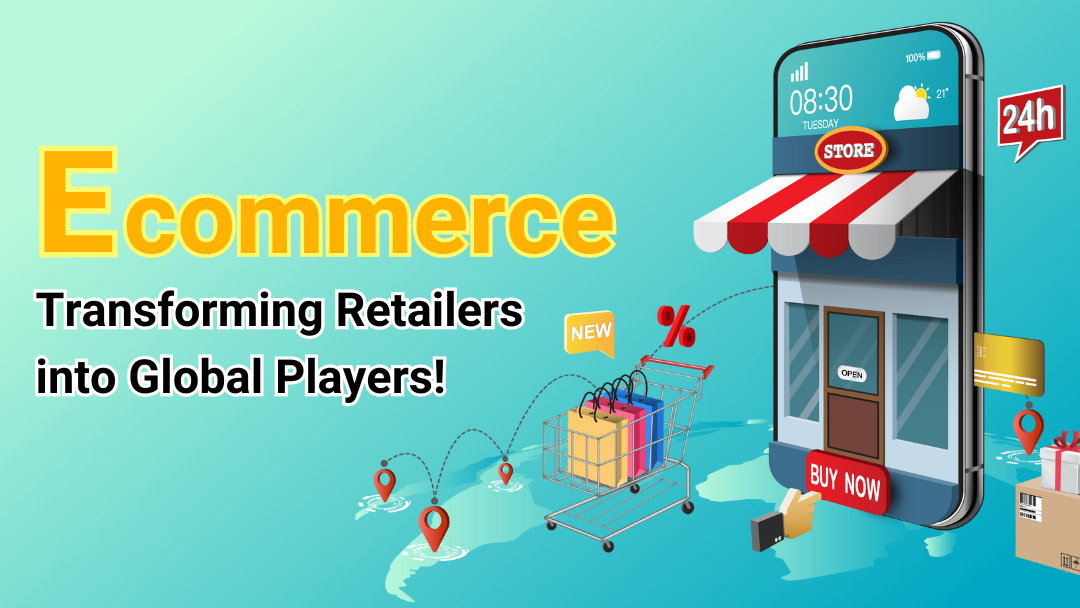E-commerce is important for retailers in order to expand their business. It offers several benefits such as reaching a wider audience, increasing sales and revenue, lower operational costs, 24/7 availability, and the ability to track customer behavior and preferences. Additionally, e-commerce allows retailers to overcome geographical limitations and enter new markets without the need for physical stores.
Through this article, let’s understand how adopting an e-commerce strategy can significantly contribute to the expansion and growth of a retailer’s business.
What is the Impact of E-Commerce on Retail Business?
E-commerce has had a significant impact on the retail business in several ways:
1. Increased Convenience: E-commerce allows customers to shop from the comfort of their homes or on the go, eliminating the need to visit physical stores. This convenience has driven the growth of online shopping and reduced footfall in traditional retail stores.
2. Global Reach: E-commerce has given retailers the opportunity to expand their customer base beyond local markets and reach customers globally. This has opened up new market opportunities and increased the potential for growth for retail businesses.
3. Reduced Operating Costs: Running an e-commerce business generally requires lower operating costs compared to traditional brick-and-mortar stores. Online retailers do not have to bear expenses associated with physical store spaces, utilities, and staffing. This cost advantage has allowed e-commerce businesses to offer competitive prices and discounts, challenging traditional retailers.
4. Increased Competition: E-commerce has intensified competition among retailers. With the rise of online marketplaces and the ease of setting up an online store, more players have entered the retail industry. This has forced traditional retailers to innovate and provide enhanced customer experiences to stay competitive.
5. Personalization & Targeted Marketing: E-commerce has enabled retailers to collect customer data and use it for personalized marketing campaigns. Retailers can analyze customer browsing and purchase behavior to tailor offerings specific to their preferences and interests. This personalized approach offers a more individualized shopping experience and can lead to increased customer loyalty.
6. Shift in Consumer Behavior: E-commerce has influenced consumer behavior, making online shopping the preferred choice for many customers. Consumers no longer have to rely solely on physical stores and can easily compare prices, read product reviews, and make informed decisions before purchasing. This shift has driven changes in customer expectations, with an increased demand for fast and convenient delivery options.
7. Omni-Channel Retailing: E-commerce has blurred the lines between online and offline retail channels, leading to the rise of omni-channel retailing. Many traditional retailers have integrated online platforms with their physical stores. This allows customers to have a seamless shopping experience across channels, such as the ability to order online and pick up in-store.
Overall, e-commerce has disrupted the retail industry and forced traditional retailers to adapt to changing consumer preferences. While there have been challenges for some brick-and-mortar stores, a combination of online and offline strategies can provide new opportunities for growth and success in the retail industry.
How E-commerce is Helping Retailers Expand Their Business?
1. Global Reach: E-commerce allows retailers to expand their business beyond their local market and reach customers all over the world. With the advent of online marketplaces and social media advertising, retailers can easily target specific demographics and expand their customer base.
2. Lower Costs: Compared to brick-and-mortar stores, online retailing comes with significantly lower overhead costs. Retailers can save on expenses related to rent, utilities, staffing, and inventory management. This allows them to allocate more resources toward marketing and expanding their product range.
3. Increased Sales: E-commerce enables retailers to sell their products 24/7 without limitations of physical store hours. Additionally, online platforms provide retailers with the ability to upsell and cross-sell related products to customers, thereby increasing their average transaction value.
4. Data Analytics: E-commerce platforms generate a wealth of data about customer behavior and preferences. Retailers can use this data to gain valuable insights into consumer trends, improve their marketing strategies, and personalize their offerings, leading to higher customer satisfaction and repeat purchases.
5. Scalability: E-commerce makes it easier for retailers to scale their businesses. They can quickly add new products to their online catalog, expand their inventory, and handle a higher volume of sales without the need for physical expansion. This allows retailers to adapt to changing market demands and grow their business at a faster pace.
6. Enhanced Customer Experience: E-commerce offers convenience and flexibility to customers, allowing them to shop from anywhere and at any time. Retailers can provide a seamless and personalized shopping experience by offering features like product recommendations, personalized offers, easy payment options, and fast shipping.
7. Diversification of Channels: E-commerce allows retailers to diversify their sales channels by selling through their own website, online marketplaces, social media platforms, and even mobile apps. This multi-channel approach helps retailers reach customers through various touchpoints, increasing their chances of making a sale.
8. Increased Customer Engagement: E-commerce platforms enable retailers to engage with customers through various channels such as live chat, social media, and email marketing. Retailers can interact with customers in real time, address their concerns, and build stronger relationships, ultimately leading to higher customer loyalty and advocacy.
Overall, e-commerce has revolutionized the retail industry and provided retailers with endless opportunities to expand their business and reach a wider audience. By leveraging the benefits of e-commerce, retailers can increase their sales, reduce costs, and improve the overall customer experience.
SUMMING UP
E-commerce has become a vital tool for retailers looking to expand their business. E-commerce allows retailers to sell their products to customers all over the world, eliminating geographical boundaries. This opens up a whole new customer base and potential for growth. Also, E-commerce enables retailers to be open for business 24/7.
Overall, e-commerce has revolutionized the retail industry by offering a more convenient and accessible shopping experience. Retailers who embrace e-commerce can tap into new markets and increase their sales while reducing costs.

